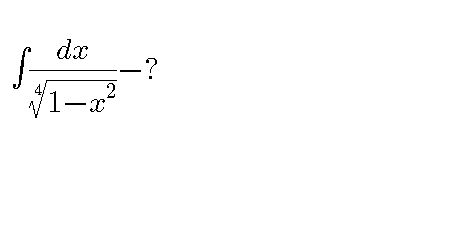
IntegrationQuestion and Answers: Page 267
Question Number 45973 Answers: 0 Comments: 0
Question Number 45972 Answers: 0 Comments: 0
Question Number 45971 Answers: 0 Comments: 0
Question Number 45970 Answers: 1 Comments: 1
Question Number 45969 Answers: 0 Comments: 0
Question Number 45916 Answers: 1 Comments: 0
Question Number 45885 Answers: 1 Comments: 3

Question Number 45841 Answers: 1 Comments: 2
$$\int_{\mathrm{0}} ^{\:\infty} \:{e}^{−{ix}^{\mathrm{2}} } {dx}=?? \\ $$$$\mathrm{plz}.. \\ $$
Question Number 45836 Answers: 0 Comments: 3
Question Number 45802 Answers: 0 Comments: 1
Question Number 45795 Answers: 1 Comments: 0
$${find}\:\int\:\frac{{dx}}{{cosx}\:{sin}^{\mathrm{2}} {x}} \\ $$
Question Number 45771 Answers: 1 Comments: 0
Question Number 45735 Answers: 2 Comments: 1
Question Number 45721 Answers: 0 Comments: 3
$$\:{Integrate}\:\mathrm{sin}\:\left({x}^{\mathrm{2}} \right){dx} \\ $$
Question Number 45706 Answers: 1 Comments: 0

Question Number 45705 Answers: 0 Comments: 3

Question Number 45670 Answers: 1 Comments: 1
Question Number 45669 Answers: 2 Comments: 0
$$\int{tan}^{−\mathrm{1}} \sqrt{\frac{\mathrm{1}−{sinx}}{\mathrm{1}+{sinx}}}\:{dx}=? \\ $$
Question Number 45641 Answers: 2 Comments: 1

Question Number 45634 Answers: 0 Comments: 0
Question Number 45632 Answers: 0 Comments: 2
Question Number 45600 Answers: 0 Comments: 2
Question Number 45561 Answers: 0 Comments: 2

Question Number 45520 Answers: 0 Comments: 1
Question Number 45519 Answers: 0 Comments: 2
$${find}\:\:\int\:\sqrt{\mathrm{2}+{tan}^{\mathrm{2}} \theta}{d}\theta \\ $$
Question Number 45498 Answers: 1 Comments: 3

Pg 262 Pg 263 Pg 264 Pg 265 Pg 266 Pg 267 Pg 268 Pg 269 Pg 270 Pg 271
